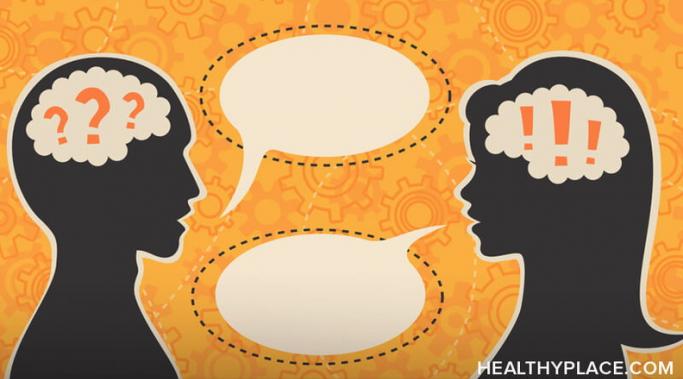Fighting mental health stigma isn't done by walking away. Although, in general, “walk away” is actually some pretty solid advice. If you’re looking to avoid confrontation, triggers, frustrations or other detrimental situations, then yes, by all means, please save yourself the grief and trouble by walking away. But as someone looking to advocate against the stigma of mental illnesses, I know that walking away doesn't help fight mental health stigma.
Dealing with Stigma
When a parent is affected by mental health stigma, there are unique problems that occur (Issues for Parents With Mental Illness). These difficulties can range from a neighbor or friend commenting on your fitness of being a parent while living with a mental health issue, to having to battle for your children during a divorce hearing, or even facing losing your children as a result of a breakdown. The important thing to remember is when you are a parent affected by mental health stigma, there is always hope and you have to focus on getting yourself better first.
Sometimes, mental illness stigma comes from a loved one's concern for us but mental illness stigma that comes from concern still hurts. For example, I don’t talk about the period of time in my life when I was suicidal. On the rare occasion I might, it will be a fleeting comment or a quick attempt to brush it off as if it were nothing. Even in the articles I’ve written about it, it’s more to talk about how it worked (the way the idea was stuck on repeat in my head; the way it drowned out all other options) rather than the way it actually impacted me. I wish my loved ones didn't react out of concern for me. When they do, I feel as if I must explain myself instead of just talking out the problem. Their concern shows mental illness stigma.
It's hard to overcome stigma and judgement but you can overcome the stigma of mental illness with peer and family support. Just about everyone who suffers from a mental illness has experienced some form of mental health stigma. Stigma can take many forms, but for the sake of this blog post, I want to focus on the type of stigma that causes others to judge people with a mental illness and lower the status of mentally ill people in social situations.
When others judge you, it affects whether they will choose to befriend you, whether they will give you the respect you are due as a human being, and it affects many different social advantages that people without mental illnesses take for granted. But you can overcome the stigma of judgement of mental illness with support.
There’s a video that came out just over a month ago that tells me to stop saying I'm depressed. It was made and posted by Prince Ea (Discussing Depression and Mental Health: Why Language Matters). Despite his enormous Facebook following, I had never heard of him before this video, but from what I can tell, he is a motivational speaker. His large following and the viral traction the video gained are the reason I want to write about it. You see, Prince Ea's message is fundamentally flawed. It tells me to stop saying I'm depressed.
The stigma of talking about mental illness shows itself in mental health conversations and proves again and again to be a double-edged sword. On the one side, there is the potential to help many people who are otherwise left in the dark and suffering in silence. Talking about mental illness can also bring awareness to people who had stigma-driven ideas of what mental health is and change their minds. Essentially, talking about mental illnesses can slice through the negative and bring about positive change (Stop Minimizing Mental Illness: Worst Things to Say). That same sword is also often used to parry against the truth of mental illness. Some people just don’t get it (and don't want to get it). They keep the ignorance of mental illness alive by talking about mental illnesses incorrectly. There can be stigma in talking about mental illness.
Excoriation disorder is more than just a habit and words around it can stigmatize. Body-focused repetitive behaviors like excoriation (also called dermatillomania and skin-picking disorder) are more than bad habits one can break. The disease is difficult enough to deal with without the misunderstandings and stigma. Very few people know about this group of obsessive-compulsive related disorders (OCD) despite increased awareness efforts from within the body-focused repetitive behaviors (BFRB) community and even outside sources. It's important to remember that words can be stigmatizing and that excoriation is more than just a habit.
You can feel depression and happiness together. When I dealt with my first severe bout of depression from my early to late teens, the best way to describe it would have been an all-encompassing darkness. It was the stereotypical, everything sucks versions of depression that we so often see in media, fiction and on the Internet. As many of us know, however, that’s not the only form of depression there is. So why are we only presented with this version of it? Why aren't we presented with happiness and depression together?
Handling a job with a mental illness can lead to stigma. To say that mental illness can make a job more challenging would be an understatement. Not only are there the challenges of actually completing a day’s (or night’s) work, of deciding how open to be about your mental illness with your boss or supervisor, and trying to figure out how many sick days are acceptable before you’ll get fired, but there are also a number of work-related challenges outside of the workplace. There is mental illness stigma around handling a job.
There’s no denying mental illness stigma is a year-round occurrence, but, sometimes, different points in the year make that stigma feel more poignant (What Is Stigma?). Summer is one of those times because it boasts good weather and longer days, and, typically, people encourage each other to be outside. It’s time to “enjoy the weather” so to speak, but that’s not always so easy. Summertime mental illness stigma can be a problem.









